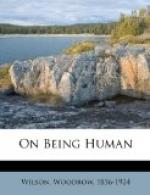to say that Abraham Lincoln was more human than William
Lloyd Garrison? Does not every one know that
it was the practical Free-Soilers who made emancipation
possible, and not the hot, impracticable Abolitionists;
that the country was infinitely more moved by Lincoln’s
temperate sagacity than by any man’s enthusiasm,
instinctively trusted the man who saw the whole situation
and kept his balance, instinctively held off from
those who refused to see more than one thing?
We know how serviceable the intense and headlong agitator
was in bringing to their feet men fit for action;
but we feel uneasy while he lives, and vouchsafe him
our full sympathy only when he is dead. We know
that the genial forces of nature which work daily,
equably, and without violence are infinitely more
serviceable, infinitely more admirable, than the rude
violence of the storm, however necessary or excellent
the purification it may have wrought. Should
we seek to name the most human man among those who
let the nation to its struggle with slavery, and yet
was no statesmen, we should, of course, name Lowell.
We know that his humor went further than any man’s
passion toward setting tolerant men atingle with the
new impulses of the day. We naturally hold back
from those who are intemperate and can never stop
to smile, and are deeply reassured to see a twinkle
in a reformer’s eye. We are glad to see
earnest men laugh. It breaks the strain.
If it be wholesome laughter, it dispels all suspicion
of spite, and is like the gleam of light upon running
water, lifting sullen shadows, suggesting clear depths.
Surely it is this soundness of nature, this broad
and genial quality, this full-blooded, full-orbed
sanity of spirit, which gives the men we love that
wide-eyed sympathy which gives hope and power to humanity,
which gives range to every good quality and is so
excellent a credential of genuine manhood. Let
your life and your thought be narrow, and your sympathy
will shrink to a like scale. It is a quality
which follows the seeing mind afield, which waits
on experience. It is not a mere sentiment.
It goes not with pity so much as with a penetrative
understanding of other men’s lives and hopes
and temptations. Ignorance of these things makes
it worthless. Its best tutors are observations
and experience, and these serve only those who keep
clear eyes and a wide field of vision. It is
exercise and discipline upon such a scale, too, which
strengthen, which for ordinary men come near to creating,
that capacity to reason upon affairs and to plan for
action which we always reckon upon finding in every
man who has studied to perfect his native force.
This new day in which we live cries a challenge to
us. Steam and electricity have reduced nations
to neighborhoods; have made travel pastime, and news
a thing for everybody. Cheap printing has made
knowledge a vulgar commodity. Our eyes look,
almost without choice, upon the very world itself,
and the word “human” is filled with new




